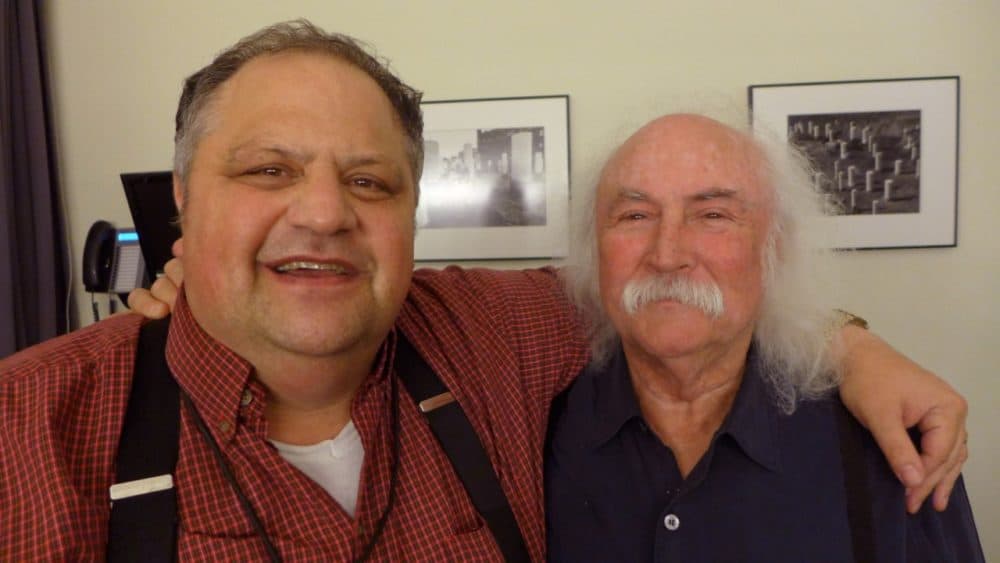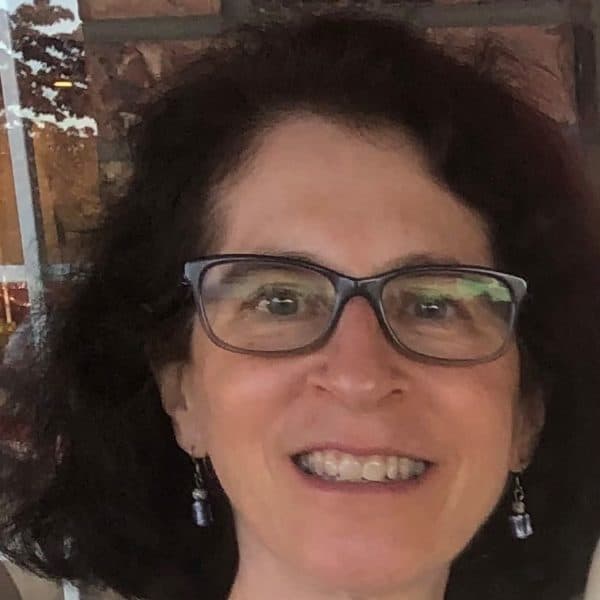Advertisement
Grieving David Crosby friend shares their decades of music and banter
Resume
Hear an extended version of this interview on our podcast, Here & Now Anytime.
For the last 30 years, writer Steve Silberman and late rock legend David Crosby remained in constant contact.
Now, Silberman is still in shock after the loss of his dear friend.
“I expect at any moment to get a text from him saying, like, ‘Death is really weird, you know?’” Silberman says.
Based in San Fransisco, Silberman is known for his book “NeuroTribes: The Legacy of Autism and the Future of Neurodiversity,” his United Nations keynote speech, his TEDx Talk and his role as a co-producer for the Grateful Dead's box set “So Many Roads.” His Twitter feed is full of photos of him and his buddy Crosby, who died on Jan. 18 at age 81.
Around age 15, Silberman first learned about Crosby when the writer heard the song “Guenivere” by folk rock supergroup Crosby, Stills & Nash in Provincetown, Massachusetts.
Silberman had never heard a song quite like it. Acclaimed jazz musician Miles Davis even recorded a half-hour version of the unique song on one of his albums.
“I thought it was the most beautiful melody I'd ever heard,” Silberman says. “The open tuning, although I did not know what [the guitar sound] was, it had a sort of cyclical almost quality, like a mantra in a sense. It was a very meditative, very serene, but also mysterious tune.”
But Silberman didn’t get to know Crosby until the early 1990s when Crosby, Stills & Nash wanted to add bonus tracks to a box set they were working on.
“A friend of mine was with them and kept saying, ‘Well, Steve Silberman says this is the best version of that song,’” Silberman says. “Finally they eventually said, ‘Well, get this guy down here.’”
So Silberman went to the hotel and hung out with the band — an “unbelievable experience” for a young fan, he says.
But at the time, he didn’t connect with Crosby. Their friendship blossomed after Silberman heard Crosby was a “fax addict” and helped the musician set up his first email account.
“[Crosby] loved it. He said, ‘What username should I use?’ And I said, ‘Well, I don't know. It should probably be something so people can't figure out who you are,’” Silberman says. “And he said, ‘I want people to figure out who, how about Cros?’”
‘The communal music maker’
Many years later, Silberman and Crosby started a podcast together called “Freak Flag Flying.” In one episode, Crosby explains how a visit to an orchestra at age 6 launched him into a lifetime of music.
“It was that they were doing it together,” Crosby said. “They made a thing by moving together, by cooperative effort. They made a sound that was so big and so beautiful. It was like, life-changing.”
Some people say you can’t hear Crosby sing lead vocals in Crosby, Stills & Nash or in rock band The Byrds, of which he was a founding member, but his strength lies in his harmonies.
“David made other people's harmonies even better,” Silberman says. “He was the ultimate communal music maker who could make everybody play over their own heads and create kinds of beauty that they would have thought they weren't capable of.”
On the podcast, the friends talked about the troubles Crosby faced in his life. It’s no secret that he burned a lot of bridges and said that his former bandmates didn't want to have much to do with him.
But at the very end of his life, Crosby made an effort to reconcile with former bandmates Graham Nash and Neil Young, Silberman says.
“David did not want things to go down that way at the end,” Silberman says. “I think if he could have lived even just a few days longer, there would have been a reconciliation.”
‘Don’t lose hope.’
In another episode of the podcast, Silberman asked Crosby what advice he has for young people today.
In his response, Crosby begged the youth to give democracy another chance and vote:
“Don't lose hope. It can seem very grim. It seemed very grim to us when we were being ignored and the country was roaring to war in Vietnam, where we should not have been. We didn't give up,” Crosby said. “You're facing a situation you young people. You're looking at a broken democracy. And we're asking you to believe in democracy. So it's very tough. Very tough for me to tell you democracy works. Only it does.”
Even in his final days, Crosby still had hope, his friend says.
“It was a hope for the transformation of the world in a more humane direction. He kept that flame burning till the very end of his life,” Silberman says. “He would occasionally, and more so as he got older, write songs that were teaching songs … He wrote songs to teach all of us well. He was one of the most thoughtful and philosophically minded people I've ever known.”
On “Freak Flag Flying,” Silberman once accused Crosby of thinking too much about death. Crosby defended that he’s not obsessed with death, but said he’s not afraid to talk about anything with Silberman — a gift the musician was grateful for — hence why he brought it up.
For Crosby, his time on Earth coming to a close could only be described as “a b****”:
“We don't have anywhere near enough time. I didn't start figuring out who I was until I was in my 50s, for God's sake. Here I am just now, finally having adjusted my life to where I'm happy most of the time and I'm going to die! Where the f*** is that at? That sucks,” Crosby said. “It's very tough. I got a dozen things that I still want to learn. Like three languages, two sections of history, at least five sciences. And I've got a wish list of places I want to see, experiences I want to have that's as long as your arm, and no time. And it's worse than that. I wasted years of time that I could have now to use if I hadn't wasted them.”
Correction: The original incorrectly version of this article incorrectly recounted how David Crosby made an effort to reconcile with former bandmates Graham Nash and Neil Young at the end of his life.
This segment aired on January 30, 2023.



